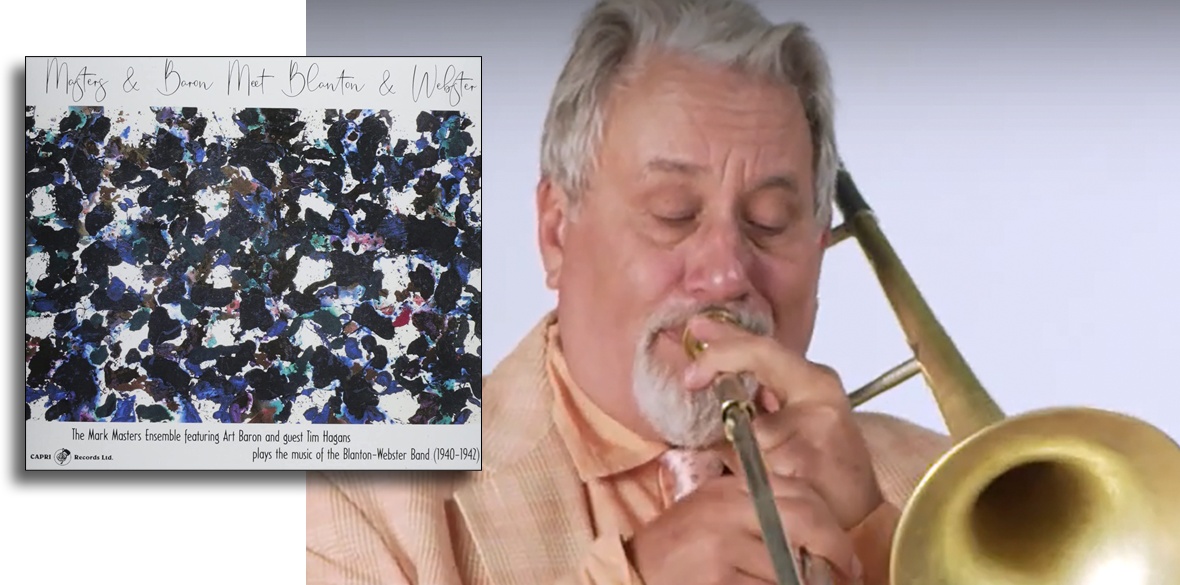This is the last article you can read this month
You can read more article this month
You can read more articles this month
Sorry your limit is up for this month
Reset on:
Please help support the Morning Star by subscribing here
ART BARON, born in Bridgeport, Connecticut, in 1950, was the last trombonist the great Duke Ellington ever hired.
He was 23 when I heard him during the Ellington Orchestra’s final tour of Europe in December 1973, at the Rainbow Theatre, Finsbury Park, London.
Still blowing strong and playing rearrangements of classic Ellingtonian tunes by Mark Masters on the new album Masters and Baron Meet Blanton and Webster, he and his bandmates play themes associated with the Ellington Orchestra of 1940-42, which included bass virtuoso Jimmy Blanton and tenor saxophone master Ben Webster.
I asked Baron what it was like as a young musician playing with some of the legendary musicians of Ellington’s yesteryears in 1973.
“It was magical! There were three others close to my age — trumpeter Barry Lee Hall, drummer Rocky White and the wonderful singer, Anita Moore.
“The rest of the orchestra were well older; Duke was 73. They lovingly called us ‘The Mod Squad’ and enjoyed our youthful energy and really respected us. It was an experience which has grown in me all through my musical life.”
How did it feel, taking solos on tunes that had been originally played decades before by trombone masters like Tricky Sam Nanton or Lawrence Brown?
“It was like a training ground. I was starting to use the trumpet straight mute with the plunger.
“My dear friend and veteran alto saxophonist Russell Procope sat across from me on the bus. He talked about getting the yahhh… sound with the plunger and to work on Tricky Sam’s solos.
“And pioneer trumpeter Cootie Williams became my close friend and a huge teacher. He taught me my parts on Mood Indigo and Black and Tan Fantasy.”
I asked him how Ellington encouraged young musicians.
“He was the same to any other players. The way he played piano while I soloed made me play better, and play things I’d never played before. I’d be playing and wondering: ‘Where did that come from?’ It was wonderful.”
I asked him about his memories of the 1973 British tour.
“All those Rainbow and Odeon theatres and a performance for the Queen! People were so warm and happy to hear and meet us.
“They didn't think of my age and asked me questions what it was like playing with Duke in the ’30s and ’40s.
“Sometimes I soloed on In Duplicate, filling in for the great tenorist Paul Gonsalves. It was a very fast blues and as I found my stride someone in the band yelled out: ‘He never misses!’ — referring to Duke hiring another good one.
“We played a lot of classic tunes. Diminuendo in Blue really swung, Caravan, Take the ‘A’ Train, of course. Simple but great charts for the trombone section including In a Mellotone.
“It was a blast playing with lead trombone and unsung hero Vince Prudente and Chuck Connors on bass trombone.
“I love the Webster/Blanton era for the great music and of course learning the Tricky Sam trombone solos, seeing how much air he put into his horn (always a lot, even on ballads).
“It’s not trying to sound like him, but to understand where he was coming from. He was extremely vocal, like in his playing ‘yayaya’ was his trademark. No-one else really played like that. No-one.
“The album shows Mark Masters’ great love and respect for the Duke and composer/arranger Billy Strayhorn too. It would be crazy to try and duplicate that, and Mark has his own language of arranging.
“An analogy is when Duke and Billy did The Nutcracker and Peer Gynt. They weren’t simply ‘jazzin’ them up.’
“It was a blending of the highest order of respect for the originals realized through Duke’s and Billy’s own voices — understanding and respecting the originals, as if Tchaikowsky, Greig and Duke were all contemporaries. Mark’s arrangements emulate this.”
And what are his favourite tracks on the album?
“I love the beautiful frame Mark gives to A Flower is a Lovesome Thing. And a new venture for me was Passion Flower — playing it as a feature with plunger was wonderful.
“Jack the Bear is my old favourite — real fun, being brought in on the bass motif. I enjoyed making the whole album, whether I was featured or not.”
There are powerful solos from trumpeter Tim Hagans, saxophonists Kirsten Edkins and Jerry Pinter and bassist Bruce Lett.
Altogether a reinvention of some of Ellington’s most memorable tunes, reminding us yet again how much a 20th century musical colossus he truly was.










